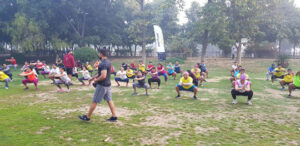Contents
What is a Corporate Fitness Challenge?

A corporate fitness challenge (CFC) is an event geared towards increasing employee health and wellness. The idea of the CFC has been around for many years but only recently have companies adopted it as part of their company culture. In order to promote a healthier lifestyle, there are various types of challenges that can be undertaken by employees. These are such as weight loss, smoking cessation, or even just getting more sleep.
There are also opportunities to support one another in achieving goals, which will help create a sense of community within the office environment. All participants must adhere to certain standards set by both themselves and the employer- these may include maintaining a healthy diet and exercise routine – all tasks should be achievable without too much strain on time or finances. The purpose is to simply get employees thinking about their health, which will hopefully influence healthier lifestyle choices beyond the duration of the challenge.
Types of Corporate Fitness Challenge

These are some types of Corporate Fitness Challenges:
Weight Loss Competition

This is a one on one competition between two employees. They compete to see who can lose the most weight over a designated period of time, such as three months or six weeks. The rewards for winning are usually cash bonuses and gift cards from fitness stores. In this program, you are looking for employees who have the right mindset to win. This is not about having fun, but more about discipline and focus on their health goals.
Workplace Olympics
These types of challenges are used as a way to boost employee morale in your workforce via competition between teams or divisions within an organization. For example, if your company has multiple offices across different states, you could hold something called ‘State vs State’ where each office competes against one another with some sort of activity that relates to work (e.g., physical tasks like moving furniture). The reward at this level would be bragging rights amongst other things! There might also be incentives for individuals completing certain tasks during these events such as gift cards from fitness stores or extra days off work.
Group Fitness Classes

Everyone can participate in this type of challenge by attending the same classes together, such as yoga or Zumba! This is a great way to get people who are less active into fitness activities that they might find fun and enjoyable. The benefits of exercise are well documented. There is a wide body of research that shows that, among other things, it reduces the risk for heart disease and diabetes. It has also been shown to increase productivity in office workers.
Fitness Boot Camps

These challenges entail participating in outdoor activity events. They might be something simple like having people join their co-workers at a local track every week for jogging sessions or it could mean going out camping together during company retreats. Participants can do whatever activities they would normally enjoy doing but should try to include physical exercise into them whenever possible to help increase overall fitness levels.
Stair- Climbing Challenge
This is an interesting concept that you could roll out in your workplace. A simple way to do it would be for teams or divisions within a company to see who can climb the most stairs over a given period of time, such as one week. The person/team with the highest number of total steps climbed at the end wins some sort of reward! You might even want to try something called ‘The Corporate Ladder’ where there are different levels corresponding with how many floors people have climbed up (e.g., level one being ground floor).
Fitness Obstacle Course

These types of fitness challenges involve having employees complete various physical tasks related somehow to their job role throughout an obstacle course during team-building events held by companies each year. For example, sales reps might have to do things like jump over hurdles while carrying a ‘box’ in the form of an actual box.
Incentive-Based Fitness Challenges
This is when you reward people for completing certain exercise-related tasks with either cash or gift cards from fitness stores. The types of exercise activities that could be completed are usually ones where employees would normally find it hard to motivate themselves and need some sort of incentive to partake in them (e.g., going out jogging or attending outdoor boot camps). In this case, though, employees can earn additional money if they reach their goals by doing these activities which makes it more likely that they will stick with exercising on a regular basis.
Lifestyle- Challenge

In this challenge, you are given a certain amount of time to complete various tasks in your day. If you reach them, you receive some type of reward! For example, if the challenge is for three days straight and it’s something like walking 30 minutes per day or doing yoga twice daily, then employees who do this will get an extra hour of pay at the end of that week which they can use however they want (e.g., put into their savings account).
Class Attendance Challenge
This is when employees get rewarded for attending exercise sessions regularly through their workplace. It could be something like two ‘class tokens’ given out at the beginning of each month. It can then be used to attend any fitness class that they want. Examples are such as yoga or spinning classes. Employees who use these types of challenges are usually more likely to increase their overall physical activity levels because it gives them an easy way to do so without having to think about what specific activities they need to commit themselves to.
Plank Challenge

This challenge entails holding a plank position for as long as you can. In this challenge, employees are usually given a certain amount of time to hold this position each day. Whoever does for a long time gets an extra paycheck.
Treadmill Challenge
This is when employees are given specific times to walk on the treadmill at their gym during work hours each week. They can try to increase how much time they spend walking every day. This is till they reach their goal of 30 minutes or more per session.
Snack Healthy Challenge

Employees have to bring healthy snacks with them instead of unhealthy ones for one month straight so that companies are able to see what changes this type of activity makes towards helping people eat better in general!
Step Counting Competition
Each participant gets an individual step counter. They try to win by reaching the highest number overall throughout a set period of time e.g., two weeks. In this challenge, whoever wins gets a special prize of their choice (e.g., new pair of running shoes).
Fitness Quiz Challenge
A fitness quiz is set up in which employees answer questions about different types of physical activity, such that you need to correctly get five out of seven in order for the next part to be unlocked! The second stage involves people actually doing whatever they said on the quiz. Whoever completes this round successfully earns some type of reward too. This challenge encourages healthy living while also making sure people learn something along the way by answering important health-related questions every day.
Benefits of Corporate Fitness Challenge

There are many benefits of the corporate fitness challenge such as:
- The first benefit is that the CFC will help you lose weight. There are so many different fitness challenges to choose from. That is why it should be easy for you to find one that you enjoy.
- The next benefit of the CFC is that it will help you increase your energy levels. You will learn how to eat healthily and exercise, which means your body will start producing more energy naturally.
- The third benefit of the CFC is that it will improve your self-esteem. You will feel better about yourself when you are taking care of your body.
- The fourth benefit of the CFC is that it will teach you how to set goals and accomplish them. Completing challenges gives you a sense of accomplishment, which builds confidence in your abilities.
- The final benefit of the CFC is that it will help you learn how to make healthy decisions. When you are surrounded by people who support your fitness journey, it becomes easier for you to make healthy choices.
Why Participate?

Healthy employees are happy employees, right? Well, that’s what it seems employers think. Studies have shown that companies that implement fitness challenges into their work culture. This results in fewer sick days, better physical health, and a decrease in their insurance costs. So, if your boss is looking for a way to lower healthcare cost without reducing benefits or increasing premiums, they should give it some consideration.
Employees are also more willing to participate in programs that benefit everyone. By promoting challenges such as weight loss you are encouraging a healthier company culture and everyone reaps the benefits.
How to Participate?
The first step is to speak with your human resources department and present them with information on CFCs. Your organization will need to take a look at what qualifies as a corporate fitness challenge. They have to make sure that there are no issues within the legal department (insurance, etc.). You may want to gather a task force that will be responsible for the marketing and execution of the challenge. Your HR department should have information on how to hire a personal trainer. He or she should have as well as any other professionals such as nutritionists or dieticians. These can provide valuable support during this time.
The next step would be to pick a date and make sure everyone involved knows about it! Ensure all participants are up-to-date with their medical information and start advertising.
Ideally, everyone is eligible and no one gets left out. The biggest thing employers need to remember is employee safety. Ensure there is adequate supervision during your fitness events, especially if anything like rock climbing or hiking is involved. You don’t want the fun to be cut short because of an injury.
Tips for Successfully Completing a Fitness Challenge

These are some of the tips you should follow to successfully complete a Corporate Fitness Challenge:
- Evaluate Your Schedule: Make sure that there are no conflicts with work or family life regarding time management
- Find an event that’s right for YOU: There are so many different events out there, so you have to pick one that fits your health and fitness levels.
- Keep Track of Your Progress: Having a chart with pictures is a great way to keep track of your weight loss or increase in strength. You can also use an app or website to accomplish this task.
- Create a Support Group: Having people who are going through the same thing as you will motivate you to stay committed to your journey.
Conclusion
People who participate in workouts with friends and colleagues are more likely to be consistent. That’s why corporate fitness challenges work. People are always looking for ways to be healthier, and one of the most popular ways is through exercise. You can help your employees stay healthy by providing them with a corporate fitness challenge. This will encourage their health while also building team morale. It’s easy to start this initiative because you don’t need any equipment or extra space; it just takes some creativity.
Do you want to keep your employees happy, healthy, and productive? Join our employee fitness program and get a healthier workplace.


